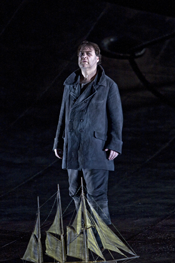
Senta’s ballad was also transposed from the original key of A minor to G minor, which called for a change in instrumentation. It underwent many changes by the time it was first performed in Dresden in 1843 and these included dividing the opera into three acts, transferring the setting to Norway and changing the names Donald and George to Daland and Erik.

The earliest versions of the opera had just one act with three scenes and the setting was the coast of Scotland. The autograph score of 1841 is, I believe, held in the national archive at Bayreuth’s Richard Wagner Foundation. So, as most of the contributors explained, Der fliegende Holländer is a very autobiographical early work from Wagner, though we read much less about the actual score we were hearing. He fantasised about a woman who would love and serve him, and he created her for his Dutchman.’ Wagner craved a woman’s unconditional faith and self-sacrifice for both him and his mission and eventually found such a person in Cosima, his second wife. Wagner identifies himself with the mythical wanderer, the Flying Dutchman.’ In another contribution the suffering of the Dutchman is identified by Christopher Wintle ( From Kernel to Crucible) as that of ‘Ahasuerus, the Wandering Jew … also a testament to the privations of a deracinated artist – pre-eminently Wagner.’ Sarah Lenton in Sighting the Flying Dutchman informs the reader that for Wagner – despite her sacrifices – Minna ‘wasn’t the soulmate he craved. Uprooted from hearth and home, persecuted by creditors, unfulfilled in love.

United Kingdom Wagner, Der fliegende Holländer: Soloists, Orchestra and Chorus of The Royal Opera, Andris Nelsons (conductor), Covent Garden, London (JPr) Bryn Terfel as The Dutchman © CLIVE BARDA/ArenaPALĪ typically informative programme for this second revival of Tim Albery’s Olivier Award-nominated 2009 production had an essay by Barry Millington entitled Igniting the Creative Spark and one of his suggestions as to how Wagner came to choose his subject for an opera was: ‘Living in squalid lodgings in Paris, Wagner and his wife are forced to pawn wedding presents and other silver items to buy food.


 0 kommentar(er)
0 kommentar(er)
